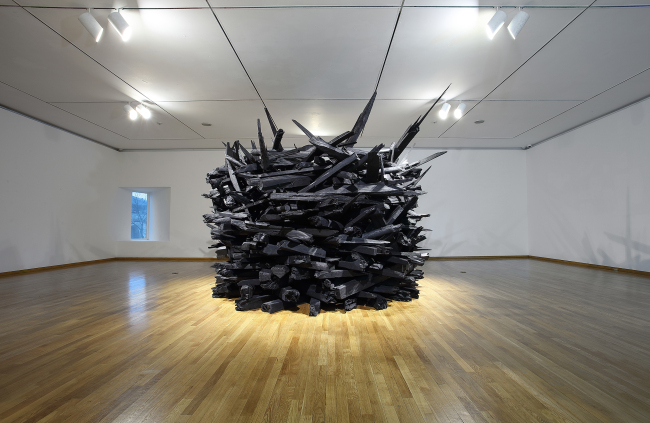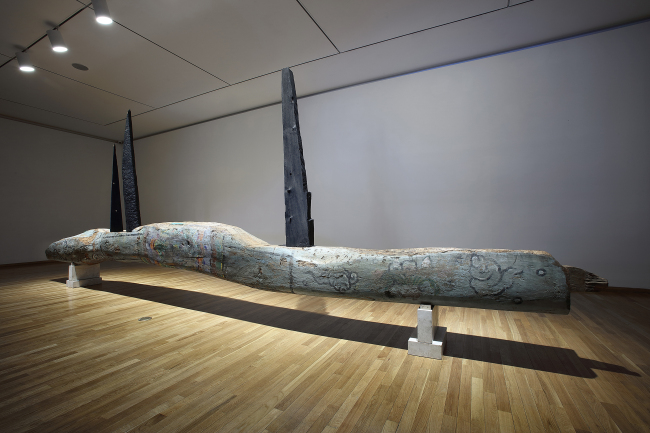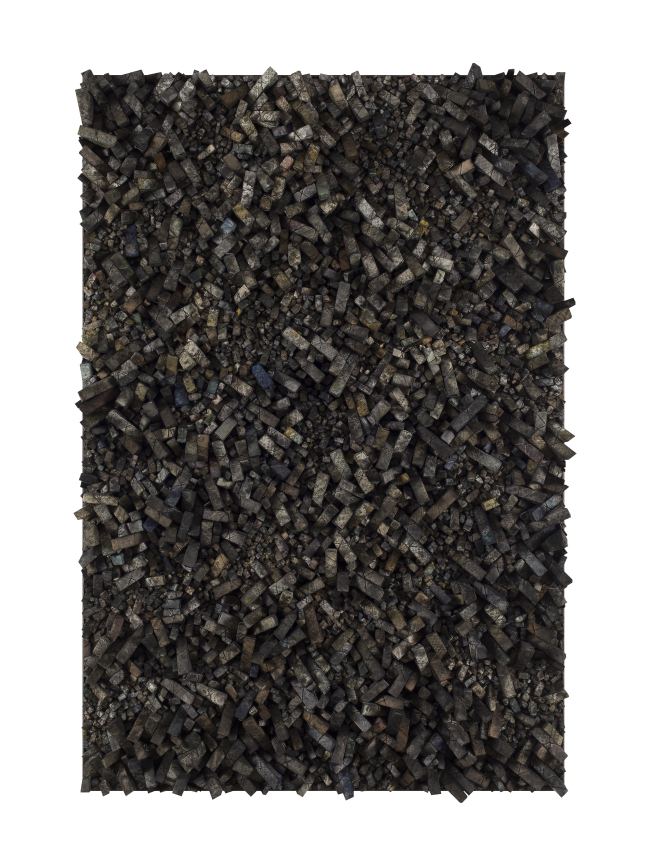Artists use familiar materials to express themselves
By Shim Woo-hyunPublished : April 12, 2018 - 17:34
In their search for their means of expression, artists sometimes turn to materials to which they are culturally familiar or emotionally attached to.
For sculptor Chung Hyun, that material is debris from abandoned traditional Korean buildings.

At his solo exhibition at Kumho Museum of Art in Seoul, Chung, who is well known for his exhibition “The Standing Man” -- a group of 47 monumental sculptures made up of sleepers -- in the garden of the Palais Royal in Paris two years ago, shows his most recent works that recycle used wood.
”Untitled“ on display on the first floor uses a some 7-meter long girder from a 300-year-old traditional lecture hall. ”Girders of (Korea‘s traditional architecture) have always been materials that I have admired, the strength that they behold,“ said sculptor Chung.

Another untitled work on the second floor is composed of discarded wooden material from hanok houses near his previous work shop. “I used the discarded wood as sculpture materials because they were the things that I am emotionally attached to. The wooden pieces from the houses near the workshop reminded me of the lives of the people who lived in those places, my longtime friends,” Chung said.
Sculptor Chung, who believes even objects that are seemingly useless still have a bit of usefulness within them, said he is emotionally drawn to materials that have endured difficult times because they resemble his life as a young man when he suffered from poverty.
The Kumho Museum of Art exhibition, which runs through May 22, also features some of the sculptures shown at the Palais Royal exhibition as well as the sculptor‘s paintings since 1996.
At PKM Gallery, internationally acclaimed artist Chun Kwang-young is holding a solo exhibition of works using hanji -- Korea‘s traditional paper made from the inner bark from mulberry trees.

Chun, whose works evoke the nation’s history through the use of individual handmade mulberry packets, said he now understands the lives of the ancestors.
Chun‘s labor-intensive handmade pieces give another sense of time, curator Asad Raza said during a press conference held last Wednesday. There is the time the spectator perceives the work, the time that Chun put in the work daily and also the time that traditional material itself carries. Chun’s work embraces multiple times, the curator also explained.
Chun is currently preparing a solo exhibition at the Brooklyn Museum, slated for the second half of the year.
By Shim Woo-hyun (ws@heraldcorp.com)








![[Graphic News] More Koreans say they plan long-distance trips this year](http://res.heraldm.com/phpwas/restmb_idxmake.php?idx=644&simg=/content/image/2024/04/17/20240417050828_0.gif&u=)
![[KH Explains] Hyundai's full hybrid edge to pay off amid slow transition to pure EVs](http://res.heraldm.com/phpwas/restmb_idxmake.php?idx=644&simg=/content/image/2024/04/18/20240418050645_0.jpg&u=20240419100350)








![[KH Explains] Hyundai's full hybrid edge to pay off amid slow transition to pure EVs](http://res.heraldm.com/phpwas/restmb_idxmake.php?idx=652&simg=/content/image/2024/04/18/20240418050645_0.jpg&u=20240419100350)

![[Today’s K-pop] Illit drops debut single remix](http://res.heraldm.com/phpwas/restmb_idxmake.php?idx=642&simg=/content/image/2024/04/19/20240419050612_0.jpg&u=)